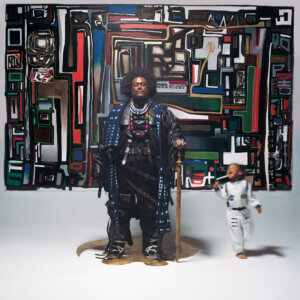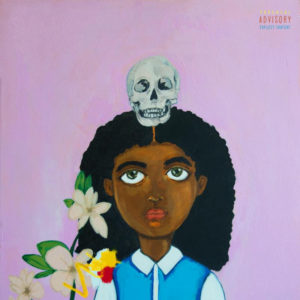
NR
Sundial
Noname
For years, Noname has occupied a strange lane in hip-hop: over jazzy, warm beats, she’s turned her focus outwards, towards politics, cultural consciousness, and Black liberation. It makes for a different listening experience, combining rap with poetry with a hefty dose of cultural critique you might find on a Twitter user’s exposé for a magazine like i_D.
Her new album, Sundial, follows the same pattern — politics dispersed over subtly cool and talented rapping. On “hold me down”, amongst a choir of voices, she acknowledges the inherent goodness America presents as — Obama’s legacy as our first Black president dwarfs air strikes he ordered in Africa and the Middle East. “I ain’t fucking with the military or JAY-Z / Propaganda for the military complex,” she raps on “namesake”, where she admonishes Rihanna, Beyoncé, and Kendrick Lamar for playing at the Superbowl. But she acknowledges her own past as well, playing at Coachella despite the owner’s homophobic past: “Coachella stage got sanitized / I said I wouldn’t perform for them / And I still fell in line, fuck,” she raps over a frenetic, warm beat.
She turns inward on “toxic”, acknowledging a past relationship that didn’t work out (“Quiet is kept, kept his ego fed”), but on “beauty supply”, she writes about a more universal, pressing truth: that the white, Eurocentric beauty trends that follow us are still able to permeate those who are most skeptical of them. “When I believe I’m prettier with my weave / When I could see the forest behind the trees,” she admits. “black mirror” touches on a disassociation between knowledge and circumstance: she’s declared herself a socialist, but what good does that do, still living in a capitalist country? “Am I supposed to feel this different? Like my rent’s paid?” she asks. The closer “oblivion” represents a sort of nihilism, though, exhaustion after running through heavy concepts in the album that preceded it: “When the world blow up, that’s it / Spinning into oblivion / Motherfucker, I don’t care, I’ma talk my shit.”
And if that were everything that Sundial was, this review would end here. But it’s not, and anyone well-versed in Sundial’s lead-up would know that one huge controversy plagues the album. A month before the album’s release, Noname announced “balloons”, its lead single, which harbors a feature by a rapper accused of rampant anti-Semitism, praising (and even getting a face tattoo of) Louis Farrakhan, the leader of The Nation of Islam, which has been condemned by the Anti-Defamation League and other organizations, along with defending Kanye (“I like Hitler”) West after his insidious comments last year. Noname faced obvious backlash on Twitter, where she defended her choice to include someone who nicknamed himself ‘Jaydolf Spitler,’ writing, “n****s legit rap about actual murder and sexual assault that they commit in real life and y’all can’t take a jay elect verse?” The frustration got so bad that, in a move of immaturity, Noname tweeted, “y’all don’t want the album. Fine.”
The song was still released intact last week, albeit alongside the album’s release instead of a month prior as a single. On the rapper’s verse, he doubles down on past comments, saying, “If anybody asks, tell ‘em Farrakhan sent me,” propagating an anti-Semetic theory about the Rothschild family, calling Ukrainian president Volodymyr Zelenskyy, and the war he’s fighting, a hoax, and alleges that no religion can stop him as he’s speaking the truth. On Instagram, Noname issued a deflective non-apology for his behaviors: “no, i’m not anti-semetic… i’m not going to apologize for a verse i didn’t write,” she said. “your disappointment truly means nothing to me.”
The crux of the situation is that Noname isn’t an ordinary rapper. As mentioned before, she has tackled, at great length and with great vision, politics, capitalism, white supremacy, and Black exploitation with her signature cool rapping style over jazzy beats. It’s common knowledge she might be the most left-leaning rapper there is. She is, for all intents and purposes, someone who would be labeled “woke,” an artist deeply defined by their political ideology: she’s quick to criticize Obama, Rihanna, and in more than one song on Sundial alleges that the true solution to most of the world’s problems is socialism. She’s started her own book club to promote and highlight Black authors, a group that has been historically underrepresented in the publishing industry. So her inclusion of the anti-Semetic rapper is a bizarre chord change, extraordinarily tone-deaf for someone who is considered, by herself and her fans, as an equality-driven, sympathetic voice who advocates for all. Has she really, one might think, not thought this through at all?
With further research, though, the problem was that she thought too much about the situation. “maybe,” she wrote in a now-deleted tweet, “i purposely [sic] did a song with jay elect to alienate my white fans.” This motivation to cut off a large portion of your fan base has some merit, when you consider that Noname’s lyrics of Black empowerment and liberation are falling on mostly white ears. “I’m not going to keep performing for predominantly white crowds,” she wrote in 2019. In a valid complaint, she said, “When I go to work, thousands of white people scream the word n**** at me. and no I’m not changing my art so it is what it is.”
This voluntary alienation is somewhat understandable in this regard, and other rappers like Doja Cat are even doing the same, with her recent Instagram rants where she refuses to acknowledge to love her fans. But in YouTuber Anthony Fantano’s review of Sundial, he brings up the point that an alternative rapper will bring an alternative fanbase, who happens to skew white. Acknowledging the fact that much of Noname’s lyricism revolves around Black peoples’ struggles in the US, which are usually not intended for white audiences, he notes that if she wishes to change her demographics, it’s as easy as changing her sound. “Lots of artists, lots of times, change their sound or go for a certain sound in order to grab the attention of people who are into that vibe,” he says. “Does Noname think she’s above doing that or something? That she should just have whatever audience she prefers to have?”
Fantano correctly labels Sundial as a “shitshow,” but it’s surprising that he’s one of few reviewers willing to condemn the album for what it is and represents. The publicity and media around Sundial has been jarring, and startlingly non-serious, especially during a time when anti-Semitism (among other hate against minority groups) surely must be taking the forefront of media publications’ minds. Apple Music and Spotify included “balloons” on their weekly ‘New Music’ playlists. Pitchfork, which awarded Sundial its “Best New Music” label along with an 8.8 rating, only touches on the scandal briefly, in its last paragraph, with writer Alphonse Pierre hypothesizing that Noname might find the anti-Semetic rapper’s apathetic tossing-off of well-deserved backlash “aspirational.” Noname, Pierre writes, might be drawn to the rapper’s “messiness.” For The Guardian’s four-star review, Ben Beaumont-Thomas notes the rapper’s inclusion as “controversial.” Craig Jenkins of Vulture includes a quote from Noname that has merit, but doesn’t make sense in this context (“One of the biggest mistakes I believe we’ve made in our struggle towards liberation in this country is allowing white America unfiltered access to our entire culture”), then moves on. Rolling Stone (four stars) doesn’t mention it at all.
I mention these publications’ ratings because it produces a nauseating effect, one that is borne from the idea that we can equate hate speech with a number. How many points should we dock for anti-Semitism? Three? Would it be less or more if it were homophobia, transphobia? How, then, to best rate an album that has baggage you’re morally opposed to? I’m a Jewish writer, and so is the editor in chief of the website where I’m allowed to publish this piece. Should we automatically give it a zero? Would any score be okay? The attitude other reviewers have, of, This is a good album, apart from that one thing, automatically dismisses anti-Semitism in the name of creative control of a project. And what does it say when his words are so easily glossed over?
When wondering why the verse wasn’t edited, writer John Mohlmacher offers a flimsy excuse that it’s not on Noname to “police and censor other Black voices” in an otherwise well-written review for Beats Per Minute. In a more critical piece for Clash Magazine, Robin Murray refutes this, saying, “There’s also no real reason why [the rapper’s verse] didn’t end up on the cutting room floor. The fact remains, though, this is her album, and her role as curator means that she had an active choice as to whether this verse was included. Her dismissal – that fans’ concerns mean “absolutely nothing” – is crude, and lacks a sense of ownership in the impact of her own work.”
I listened to “balloons” on my initial go-through of the album. I found it unsubstantial, then deleted it from my phone. But other songs on Sundial, I’ll keep listening to: the first two and “namesake” are, admittedly, great. The wonderful thing about content creation and dissemination is its pick-and-choose nature: artists are humans, after all, who make decisions that we might not agree with. There’s levels to what we’re okay with. I’m a massive fan of the rapper Azealia Banks, whose lyrical dexterity sometimes outweighs the outrageous things she does online (she has also said bizarre things about Judaism). With Noname, it’s a little more tenuous: because I’m not so deeply entrenched in her work, I probably won’t be tuning into her future projects because of the scandal (also, notably, because Sundial is just okay). But that’s my decision for me to make. It would be odd for me to end this review with a message, urging a worldwide boycott of Noname’s work because of all of this. She has provided years of comfort for fans who take solace in her work as a Black woman that calls attention to how unfairly America has treated her and so many like her. And that relationship is not for me to sever. Whether shortsighted or madly pre-planned, Noname’s hypocrisy on Sundial sours not only the project, but also the years-long image she’s worked hard to build. And during this particular political moment, there’s no reason for a mishandle this bad.
Stream Sundial by Noname HERE.
Latest Reviews
Tracks
Advertisement
Looking for something new to listen to?
Sign up to our all-new newsletter for top-notch reviews, news, videos and playlists.










